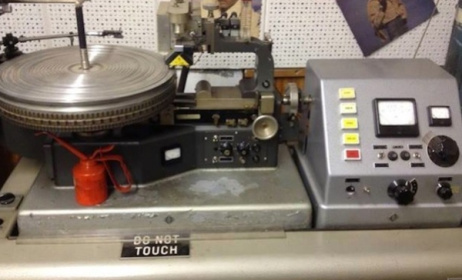The vinyl treasures of James Rugami’s record shop
It is said that one man’s trash is another man’s treasure. James Rugami has been making treasure from trash for about 32 years now. With all the advancements in technology one would think that in 2018 the vinyl record is dead and buried, but Rugami’s thriving shop in the bustling Kenyatta Market of Nairobi begs to differ. If you get lost on your way there, simply ask where the record store is – it's the only one of its kind in East and Central Africa.
 James Ragumi at his Kenyatta Market record store. Photo:Ilwareed Online.
James Ragumi at his Kenyatta Market record store. Photo:Ilwareed Online.
Visitors come from all over the world to discover African classics in the store nestled in this muggy meat market. “My best artist is Manu Dibango. I actually have an original press of the Soul Makossa album. I keep it in a special stash of my most prized merchandise,” Rugami tells Music In Africa.
A key element of Rugami’s business is acquiring vintage turntables, recorders and vinyl from both willing and unwilling owners. The art of convincing people to part with priceless items is one he’s honed from early on. In 1986 one of Rugami’s older brothers owned a record player that he treasured with his life, even though it wasn’t working. At the time Rugami had seven singles but nowhere to play them. But he was persistent. “It took a lot of coercing and trickery but my brother finally agreed to release it,” Rugami says. “After I got it, I fixed it and that was how my journey with vinyl began."
Apart from selling records that some collectors pay top dollar to own, Rugami also restores and sells record players – a side business that has become somewhat of a necessity. About 12 years ago when he decided to fully specialise in selling vinyl, he realised that he could only sell records if his local clientele owned functioning turntables. At the time many fake technicians were destroying record players under the pretence of fixing them.
“Most record players are either hidden somewhere gathering dust, rotting at a quack technician’s workshop or stolen and lost forever," Rugami says. "In the end I had to get into the restoration business to sustain record sales, but I also realised that it was a lucrative business. Restored record players retail for as high as 300 000 Kenyan shillings ($3 000).
The technological age that was expected to deal a death blow to vinyl is ironically responsible for its rebirth. Vinyl lovers continue to connect on social media, growing the culture at an astounding rate, and Rugami relies heavily on the Internet to source long-lost records and record players. The rule of the game is that no record player is left behind, because even the irreparable machines provide spare parts for the restoration of salvageable players.
“CDs are actually the ones that are dead. These days people order either digital music or vinyl records. You really can’t compare the quality of music you get with a good vinyl player with the crap you get from a CD or digital source,” Rugami says.
Most of today's vinyl junkies say that LPs produce a crispier and richer sound quality that cannot be replicated by digital media. They say vinyl makes music come alive. Perhaps this is also owed to the feeling of nostalgia that listeners experience when playing their favourite records.
Rugami says making classic records involved more than 50 people to produce and press. In the olden days, music was recorded with full live bands. In addition, there were artists who designed, painted and printed the sleeves. The cooperation of this entire ensemble created elaborate masterpieces that are still treasured today.
“Music like wine increases value with the years,” Rugami says. “A group like Ladysmith Black Mambazo have a waiting list that is a year-and-a-half long for people who are looking to book them.”
What Rugami loves most about his work is the opportunity to share his passion with the next generation. His shop serves as a museum of sorts where kids come on school trips to learn about vinyl and music history. Some bring their grandparents' old record players for repair so they can begin building their own LP collections.
“A few years back many people thought I was mad because I stuck to this archaic way of playing music while the world was moving on to greater technologies. But when I see kids as young as four years old discover the power of vinyl right here in my shop, I realise that it was all worth it,” Rugami says.


































Comments
Log in or register to post comments